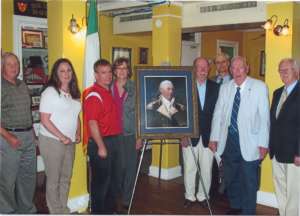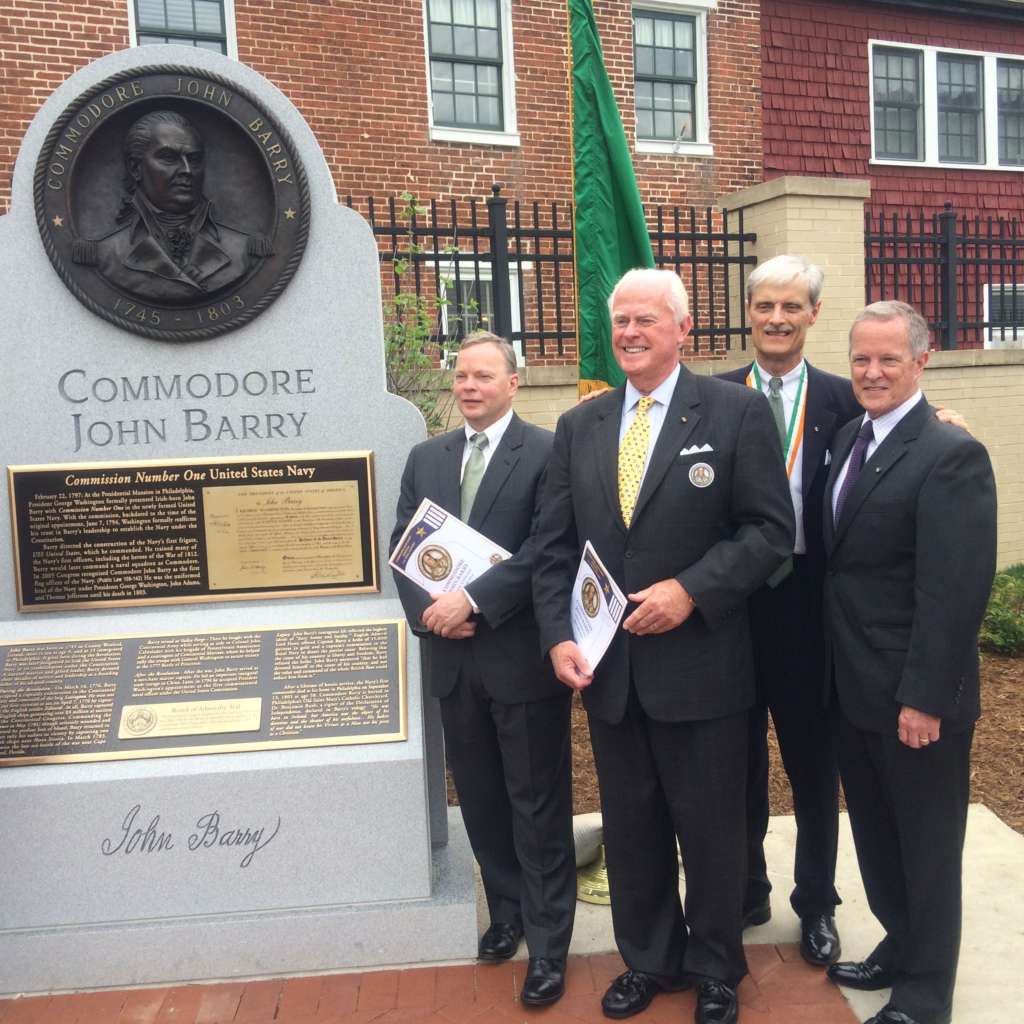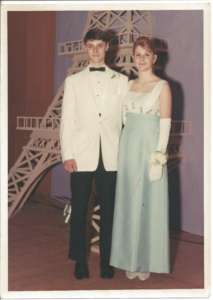“The way I approach it is, if I can be kind to others in my little orbit, in my family and the people who are around me, if everybody did that, it would be a wonderful world. So I’ll just keep trying to do that. And that’s the best I can do.”
If, indeed, everyone was able to do just a small bit of what Russ Wylie does, the world would be a better-than-wonderful place. The man who is being honored this year with the Commodore John Barry Award by the Delaware Valley Irish Hall of Fame has lived a life guided by that principle, one that along the way has resulted in considerable and far reaching contributions to the Philadelphia Irish community. His work on behalf of the 69th Pennsylvania Volunteer Infantry, Old St. Mary’s Church, the Commodore John Barry Memorial at the United States Naval Academy, St. Anne’s Church, Duffy’s Cut and the Society of the Friendly Sons of St. Patrick has insured that the people who may have once been consigned to merely a place in history will instead live on for future generations to know and actively remember.
Born in 1949 and raised in South Plainfield, N.J., Russ grew up influenced by the kind of example he himself lives by today. He describes his father, Russell D. Wylie, as “the kindest man that I’ve ever known.” Trained as a machinist, his dad worked his way up to the position of plant manager at Bell Laboratories in Murray Hill, N.J., which at the time was the top research facility in the world. “He was fascinated by scientific things. He didn’t go to college, he went to technical school. But he could do anything. He and his dad had a custom auto care business in Plainfield, where they would do custom upholstery, redo convertible tops, work on the inside and do bodywork. They’d even do custom work for private airplanes. My dad taught me a lot of stuff, we had a workshop down in the cellar of our house, and he taught me carpentry, painting … we had a lot of good memories working together in the shop downstairs. My mom [Edwina Hazen] was a nice lady, she loved gardening and was very close to her sister, my Aunt Marian. I’m very fortunate to have been drawn to my parents in this life.”
Russ and his wife Jean have two grown children, Russell Dawson and Erin, who can say the same thing about their parents. High school sweethearts, the two went to the prom together, but can trace their first meeting back to kindergarten. “They had the kindergarten set up in split sessions, morning and afternoon, and when I was in the morning session, Jean was in the afternoon. But they had this field trip to the Staten Island Zoo [for both sessions]. And parents could come with you, and my mom came on the trip and someone took our photo. In the background there’s this cute little blonde haired girl with a tiny wicker picnic basket, right between us. Years later, when we were looking at old photos with the family, Jean said, ‘I used to have a picnic basket just like that!’ And then she realized, ‘Oh, that’s me!’
Russ Wylie and Jean Dolinski married in 1975, and in 1976, Russ received his MBA from Rutgers University. Those early years of their marriage took them away from the east coast, first to the Chicago area, and then to Prairie Village, Kansas, along the Santa Fe Trail right outside of Kansas City. It was an idyllic place to raise young children. “We lived on a street that was tree-lined, and it was a combination of younger families and older people who had lived there a long time and kind of adopted our kids; they were so nice, so hospitable, and they reached out to us. If you needed anything, they’d help you out.” While there, Russ worked as assistant vice president of the largest home builder in Kansas City. He became a board member and then chair of the Construction Committee for Habitat for Humanity in Kansas City, Missouri, one of the country’s original chapters.
In 1985, Russ and Jean brought their family to Philadelphia to be closer to his mom (after the passing of his dad) and Jean’s parents. He became assistant vice president of Dover Historic Properties. “I was very interested in historic restoration from kind of a social service aspect of it, besides being a real estate business where you bring these beautiful old buildings back to life.” It was the perfect combination of Russ’ business background and all the skills he had learned at his father’s side—with his love of history at the forefront.
It was this love of history that in 1993 led to Russ’s involvement in the Irish community. He and his son, who was 14 at the time, went to see the movie Gettysburg. Like his father, Russell Dawson was hooked on history. The two began seeking out historical re-enactments and joined the 69th Pennsylvania brigade. Russ became secretary of the organization, and remains involved to this day. In 1999, Russ co-chaired the Irish Civil War Soldier Commemoration Day Ceremony along with Norbert McGettigan, where the 69th Pennsylvania received the Philadelphia Medal of Honor. He organized and became head of the Citizens Committee for the 150th anniversary re-enactment of the 69th Pennsylvania Regimental Flag Ceremony at Independence Hall in 2014, and continues to periodically participate in tributes at local Catholic cemeteries and on Remembrance Day at Gettysburg National Military Park. “When you’re in camp, and everybody is authentically dressed and you cook your food on the campfire and you go out and have these mock battles, you don’t think of anything that’s in the 21st century or the 20th century. You’re back in the 1860s.”

Donation of Portrait of Commodore John Barry by Jack O’Brien to the Commodore John Barry Club, June 3, 2015
“The account of the 69th Pennsylvania is fascinating history and especially relevant to Philadelphia and the Irish American immigrants that came, because they ran into so much discrimination … so their option to be able to gain some money by being paid as a soldier, and also if they died or were severely injured there would be a pension for their family, that’s why so many of them joined the Civil War on the Union side.”
When Russ joined the Society of the Friendly Sons of St. Patrick in 1999, his involvement in the legacy of Irish Philadelphia took a new and even greater turn. It’s led him here today, and is taking him on a continuing journey into the future. He was sponsored for membership by Norbert J. McGettigan and Philadelphia Police Commissioner John Timoney. One of the first things he did was to become chairman of Commodore John Barry Day on September 13, 2003.
“I got involved in doing some of these special things and I was challenged to do this. It happened to be around the day of the death of Commodore Barry, so I set the whole thing up to commemorate his memory. There were speakers, it took place in the park across from Independence Hall, and we had a ceremony right at the statue. Commodore Barry meant a great deal to the Friendly Sons because he was one of their early members.”
Russ served as president of the Friendly Sons from 2006 to 2008, and then at a special meeting of the society on June 17, 2015, then President Joseph Heenan asked him, “How’d you like to be secretary of the Friendly Sons?” It would prove to be a groundbreaking term as the society, for the first time in their history that dates back to 1771, voted to allow women as members. On March 12, 2016, women were inducted at their annual gala. Russ Wylie was instrumental in making this happen. When President Heenan initially asked Russ for his opinion on whether women should be members, his immediate response was, “Absolutely.”
“I’m totally in favor of that. And there are so many reasons. After what we did in Philly, I helped initiate a national gathering of some of the other Friendly Sons groups, which was informal … they were all very interested in what the Philadelphia chapter did.”
“One of the things that attracted me to the Friendly Sons is that even though Philadelphia was predominantly Protestant at the time the Friendly Sons started [in 1771], and most of the founding members were Protestant, they elected Stephen Moylan, who is buried at St. Mary’s Church graveyard, as the first president. So you had the majority of the founders who were Protestant and they had the sense of equibility to vote for a Catholic to be the first president. That was great.”
It was during his early years in the Friendly Sons, and in large part due to his involvement with the Commodore John Barry commemoration, that Russ became involved with Old St. Mary’s Church on 4th Street in Philadelphia. He officiates, along with Rev. Msgr. Paul A. DiGirolamo, who celebrates the commemorative Mass there, on Memorial Day weekend at the graveside of Commodore Barry. “Old St. Mary’s was the second Catholic church built in the city, after Old St. Joseph’s Church. It actually became the first cathedral in Philadelphia. And that’s where there are a number of prominent figures from the American Revolution buried, including Commodore Barry.”
He was also instrumental in the digitization of the Barry-Hayes Papers at the Independence Seaport Museum. His continuing contribution to the remembrance of Commodore Barry has seen him work to establish the memorial at the U.S. Naval Academy in Annapolis, Maryland. Phase two of the project, the Barry Memorial and Plaza, was dedicated on May 10, 2014. And on June 3, 2015, he saw to the donation of a portrait of Commodore Barry to the Commodore Barry Club of Philadelphia by Jack O’Brien, who is co-founder of the Barry Memorial Project.
While others see the extraordinary in what Russ has accomplished, he has never looked for acclaim or accolades. “I’m so honored. I didn’t think I’d ever get any type of recognition like this. It’s just so nice.” He is the first one to mention others involved when asked about his own accomplishments. In discussing his work with the St. Anne Historical Committee of St. Anne Parish, he talks first of his meeting with Father Brady, who “was working as a member of the Friendly Sons. He facilitated my coming to the initial meeting at the parish. It was a seed that was planted. We talked about what we might be able to do. One of the two focuses at the meeting related to the Civil War history of St Anne’s, and also that St. Anne has these really old record books.” And those record books are now digitized and part of the Falvey Library online collection of Villanova University, preserved for future generations. Along with Philip Duffy, whose role in the history of Duffy’s Cut is now known and whose grave is now marked at St. Anne Parish, the names of all the Irish Civil War veterans buried in the cemetery will be remembered to future generations.
“All the organizations I’ve been involved with, they’ve just been a magical group of people that came together—pretty much like the incredibly foresighted and brilliant people that came together at the time of the American Revolution—to make things happen.”
What those organizations also had in common? The grandson of William H. Wylie from Orkney, Scotland, and Elizabeth Dawson from Castledawson, County Derry, Ireland, Russ Wylie to serve on them.
The 2019 Delaware Valley Hall of Fame Awards Dinner will be held Sunday, November 17 at the Irish Center, 6815 Emlen Street on Mount Airy, starting at 5 p.m. Tickets $65 per person. Tickets and information here.


